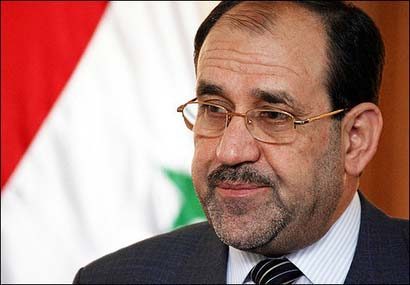
In what can be described as a strategic breakthrough, Iraqi Prime Minister Nouri al-Maliki came to Russia as a special guest. He came to talk about the grounds for a deep and wide-reaching partnership on issues from armaments and oil to commercial exchange, reconstruction in Iraq, postsecondary education, and infrastructure. What could that mean but the open declaration of U.S. defeat in Iraq?
Since the withdrawal of U.S. occupation forces from Iraq, conflicting indicators have appeared about what that withdrawal means in terms of defeat. True, the U.S. ambassador did not flee — as we hoped would happen in a helicopter — but the occupation ended without U.S. bases and without open U.S. influence. Also, there’s a strange kind of understanding between the Washington and Tehran forces that reigned over Iraq, with Iranian influence seen as more probable.
The Syrian crisis is what revealed the extent of the Iraqi decision for independence vis-à-vis Washington. Baghdad stood by Damascus, not just as a corridor for Iranian aid, but also as a supporting partner and as an ally in confronting the Gulf.
And with this very background, conflict flared up, with the forces of political Sunni Islam and the government of Kurdistan on one hand and al-Maliki on the other hand. And the worst side of that conflict is the escalation, supported by Islamists and the Gulf, in concentrated terrorist operations by al-Qaeda in Mesopotamia. These operations have turned from hostility towards the Americans to their advantage.
Perhaps al-Maliki — the strongman of Iraq who is imitating Saddam Hussein’s performance — was waiting for an opportunity to show the extent of Baghdad’s independence to Washington and Tehran together. Now, there’s a crystallization of the regional and international political situation into a new scene: a U.S. retreat on all fronts and a swift Russian advance to multipolarity in international politics.
Al-Maliki is moving freely in the new scene from a new position. Damascus is no longer a power seeking influence in Iraq; it is now seeking support and backing. Tehran is no longer the great ally; it is now ally number two in an alliance that is headed by Moscow and includes China, Iran, Iraq, Syria and Lebanon. And in the space created by this alliance, the strategy for Baghdad became fixed. There is no tolerance or reconciliation with the Muslim Brotherhood, the Salafis or al-Qaeda. Also any compromise in Syria, even if it included profound changes, shall not include any of the forces of political Islam. This applies, of course, to Iraq, the country that also benefits from the strategic lines starting to form in the Gulf. In the possible compromise, Western Asia is a Russian East in exchange for limiting U.S. influence within the borders of the Arabian peninsula. Even there, it will remain an anxious influence, drained by external pressures and the factors of internal disintegration.
Outside the geopolitical demarcation crouch the Israelis, the Palestinians and the Jordanians. The features of Israel’s fate have become clear. They turn inward behind a wall of settlements in a hardened fortress, strong and unassailable but unable to intervene on the outside. Regarding the Palestinians, what is on the table for them are Gaza, half of the West Bank and a partnership in Jordan either in the framework of a confederacy or not. And there is no suggestion for the Jordanians, gone astray, other than to accept the result of the conflicts and compromises.
Against this background comes my realistic, proactive suggestion: We have no other choice than to put our international relations in line with a Russian-Iranian-Levantine alliance. We will not be able, because of numerous complications, to be part of it, but we can move within this context. We have good relations with Moscow that we should work to develop profoundly and earnestly in various fields. Also we have a heritage of good relations with Iraq that we should work to regain without delay. Baghdad has a strategic interest in reviving those relations to get its western regions under control and avoid positioning Jordan in a Gulf alliance against it. And Jordan has a strategic interest in Iraq, not only in energy and economic fields, but also fundamentally to fortify our independence and our ability to confront attempts to wipe us out.
The time has come for a Jordanian strategic awakening that realizes that the era of the United States and the Gulf is fading. Jordanians are facing the fact that the time is ripe for geopolitical repositioning in order to preserve their nation and existence.

Leave a Reply
You must be logged in to post a comment.